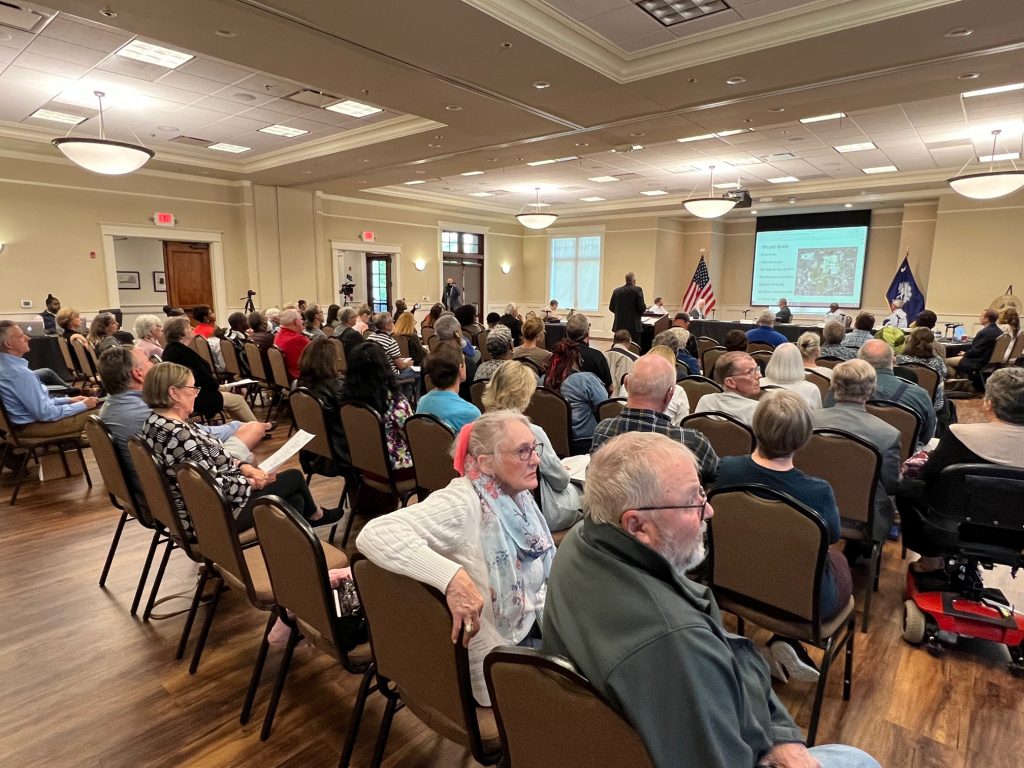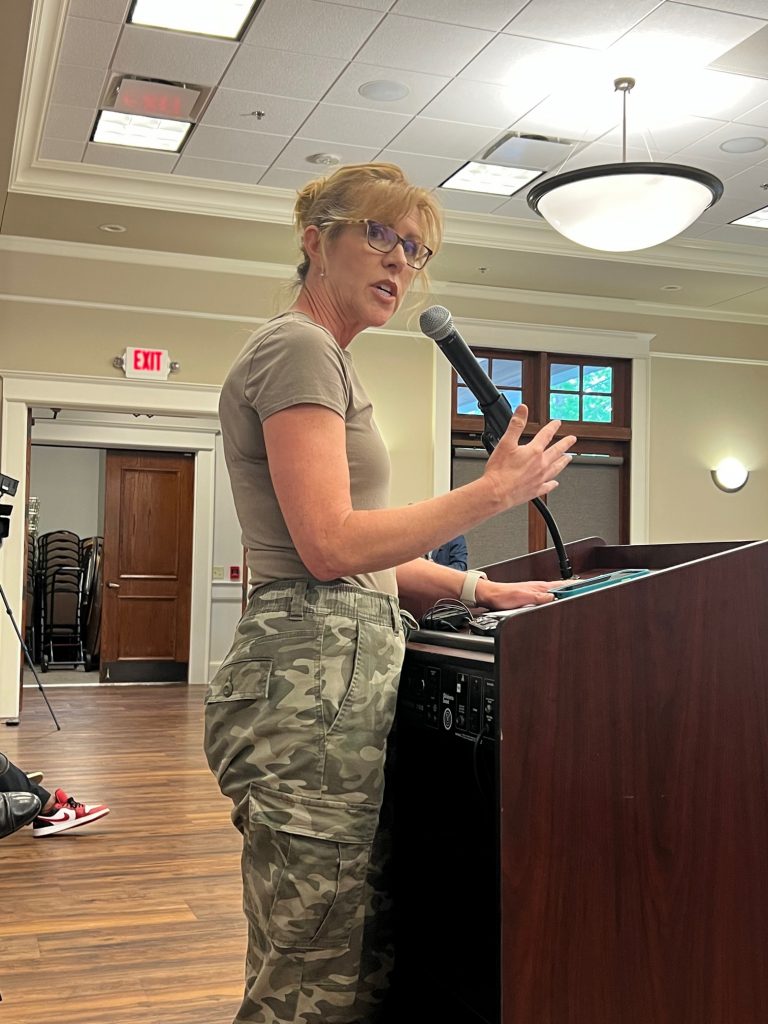Ruble, Pugh plan more talks with Ashley Oaks neighbors concerning rail noise abatement

BLYTHEWOOD – In a 4-1 vote Monday night, the Blythewood Council gave first-reading approval of the rezoning for a 290-acre parcel slated to become part of the Scout Motors industrial development.
A rail yard is proposed for the property to support the 1,100-acre industrial-zoned site where the bulk of the planned automotive manufacturing facility is to sit.
“This project is transformational,” said Town Councilman Donald Brock, who described the anticipated 4,800 jobs and $300 million payroll of the proposed auto plant as a proverbial rising tide that will lift all boats. “It will change this community for the better.”
In addition to Brock, yes votes came from Mayor Bryan Franklin, Mayor Pro-Tem Eddie Baughman, and Town Councilman Rich McKenrick.
Town Councilman Sloan Griffin cast the sole vote against approval of the rezoning, saying residents should have more time to process news of the project. Griffin proposed deferring the decision until all relevant studies are complete, but his motion died for lack of a second.
“I think for some residents, they’re looking at it as a disaster. I think they’re looking at it as a ticking time bomb and we’re rushing,” Griffin said. “Listening to them, I think we owe them a deferment on this vote. We owe them a chance for the county to get the right data.”
Other members of the council said they expect to receive the results of noise and environmental studies before the second reading of the rezoning next month, when the council would have to vote again for approval in order to have the rezoning take place.
In a packed meeting room, more than a dozen residents from the Ashley Oaks subdivision spoke against rezoning of the land, which sits south of the Blythewood Industrial Park and north-northwest of the neighborhood.
The rezoning to light industrial 2 (LI-2) zoning, which Town Administrator Carroll Williamson said complies with the town’s comprehensive plan, because of its proximity to current industrial land, was unanimously recommended for approval by the Blythewood Planning Commission.
Residents – the closest of whom lives about 650 feet from the proposed location of the railyard – have complained that potential noise, traffic, and environmental impacts could harm their property values and quality of life.

“It’s just like we were on the wrong side of the track, and it felt like we were railroaded last week,” said Steve Abrahamson, an outspoken subdivision resident who has threatened lawsuits over various aspects of the project – and has called for sound and environmental monitoring before the railyard is built.
“Is this really all going to have empathy or really take our concerns in, or is this just a show?” asked Abrahamson, who also expressed doubt about the safety of electric vehicle
technology and concern about the risk of a toxic battery fire. “I can’t trust ‘em… because it’s all about money: greed, greed, greed.”
Fellow Ashley Oaks resident Viola Konopka, noting that similar projects on other South Carolina towns are located farther from residential areas, says it’s the proximity to homes that has her concerned. She’s worried about sound and environmental impacts to the area where she lives.
“If they want to stop the sound, they’re going to have to put up sound walls. Sound walls that are not going to be hard sound walls just for appearance, but sound walls that are going to absorb the sound,” she said.
“We have beautiful country behind us – we have trees behind us, we have birds behind us… we have all of these deer, and I saw a coyote just the other day walking in the woods,” she said, describing how she’s enjoyed having nearby green space. “Is that area going to be left clear and open so that the wildlife can move around? If we’re going to have it [the railyard], just make it at least so we can live there.”
In a contrasting view, Councilman Brock read a letter from the executive director of the Greater Blythewood Chamber of Commerce, Phil Frye, expressing support for the project from the majority of its members and board.
Councilman McKenrick, who also lives in Ashley Oaks, cited a realtor neighbor, who did not speak in the meeting, in stating that property values would likely go up as the site is developed.
Jeff Ruble, economic development director for Richland County, who was also speaking on behalf of the project, said legitimate concerns raised by residents would be addressed.
He shared some of the history behind the project, including the four-year process of creating the industrial park while actively recruiting industry to the area and the need to provide jobs for county residents and grow the tax base to fund schools.
Local leaders first heard of Scout Motors in December, he said – and were first informed of the company’s decision to locate in Blythewood on March 3, via a phone call from the governor.
The project has garnered the biggest economic development incentive package in South Carolina history.
“We don’t want to hide anything. We’re trying to do everything we can to work with folks to help achieve our results. We want this to be a win-win,” Ruble said, detailing some of the public meetings that have been held and the accessibility of county and town leaders to discuss the issue.
At first, he said, “The only conversation was about roads and traffic, and I think we were able to respond positively. A new interchange will be built, four-laning other roads, improving intersections. I think our goals is not to add any traffic woes but instead try to alleviate them.”
In response to the more recent complaints about potential noise impact on nearby residents, he says the county has commissioned a noise study – and vowed to follow through on any mitigation the study requires.
“If there are things that are needed that the noise study recommends, we commit that we will get the money to pay for that,” Ruble said. “We’re not going to turn our backs and leave anybody out in the cold.”
Mayor Franklin said that by the time the rezoning request reaches its second reading, noise and environmental study results will be available.
Councilman McKenrick also pointed to the longevity of the planning process for the site.
“This is not a hurried process. This has been going on through the planning commission and through council for 10 years, the fact that 1,600 acres is planned for an industrial park,” McKenrick said.
“I want to point you to the 2020 through 2030 comprehensive plan, which is available to all Blythewood residents on the town’s website, on which the planning commission in conjunction with town council spent numerous hours, numerous public meetings, numerous public hearings, before we were able to pass this comprehensive plan… and I want to point out that the comprehensive plan makes no less than 12 direct references to the industrial park.”
The rezoning will come before the council again for second reading at its May meeting. If the rezoning is approved, the company will then have to present a site plan to the town for review and approval before development of the site can proceed.
Also at the meeting, the town approved the first reading of a zoning ordinance change reducing the number of parking spaces required for industrial facilities. The new ordinance would require one parking space per 1,000 square feet of indoor floor space, a change from the current requirement of one parking space per 300 square feet of indoor floor space.
Williamson said the current standard is “excessively high relative to the standard minimum for manufacturing uses in the country.”
The new standard was recommended by a zoning consultant and was also unanimously recommended for approval by the Blythewood Planning Commission.















